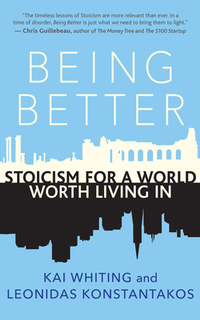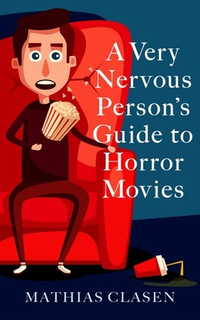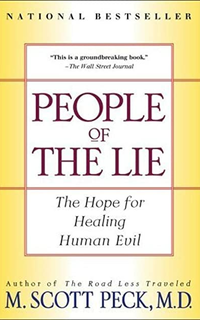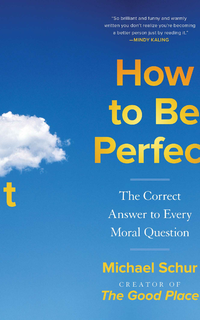Collection
Weekly Non-Fiction Reading List Feb 21 2022
This week, I finished 5 books from some amazing authors. We have quite a few fantastic philosophy books on the list as well as a book about the idea of evil, and there’s also a great book about the psychology of why we love (or hate) horror movies. Enjoy!
- Curated in Weekly Non-Fiction Reading List Feb 21 2022
This is definitely one of the better books on stoicism. When I first got into stoicism, I loved it because I saw a lot of parallels with the 12-step programs where I got sober. Soon, I saw that stoicism was being pushed by a lot of bro entrepreneurs, and it didn’t seem like it aligned with stoic values. This book from Whiting and Konstantakos takes a unique stance on stoicism and really discusses what it means to be stoic as well as virtuous. While it’s great to learn how to manage emotions and accept what we can’t change, the good life involves living a meaningful life while causing as little harm as possible. This is a quick read, but it’s extremely impactful and I really hope a lot of people check it out.

- Curated in Weekly Non-Fiction Reading List Feb 21 2022
I had zero knowledge of Simone de Beauvoir other than hearing her name now and then. This book not only made me interested in some of her work, but I gained so much value from the lessons Cleary pulls from Beauvoir’s work. What made this book great is that it’s maybe 40-50% biography, but the rest is analyzing Beauvoir’s ideas and explaining them with real-world examples. Cleary pulls from some personal stories such as her experience being a woman or about marriage, and she also explains how Beauvoir's ideas can be applied to modern-day activism and other situations. It’s also great because as much as Cleary respects Beauvoir’s work, she discusses some of Beauvoir’s controversial or outdated views as well.
This book is phenomenal, and I haven’t gained this much value from a book in a while. I’ll definitely be re-reading it, and it deserves a ton of attention once it launches.
- Curated in Weekly Non-Fiction Reading List Feb 21 2022
The only thing that bothers me about this book is that it wasn’t released through a mainstream publisher. This book is absolutely amazing, and every horror fan or person (like me) who was/is afraid of horror movies will love this book. I’ve read a few books on the psychology of horror because I only recently got into horror movies in the last few years because of my girlfriend, and it’s just super interesting to me. Mathias Clasen has written one of the best books I’ve read on the topic and dives into so much fascinating research about why we love or hate horror, what makes good horror, why horror movies don’t get enough respect, and even introducing kids to horror to increase their resilience. Top-to-bottom, this book is fantastic, and it should be on some big best seller lists because I know a ton of people would appreciate it in the horror communities.

- Curated in Weekly Non-Fiction Reading List Feb 21 2022
I couldn’t put this book down, and it was for all the wrong reasons. Scott Peck is/was a psychologist (not sure if he’s still alive as this book is older), and if you ever encounter a psychologist or therapist like him, please run for the hills. A friend recommended this book because I’m interested in books about the idea of evil, and I was not prepared for this book. The first two-thirds of this book is just stories of his patients and showing his bad practices and unethical behavior. To summarize his views, his patients are good people but toxic people in their lives are evil. No nuance. No empathy or compassion for the toxic people and what they may have gone through and the fact they probably need therapy to. Just a label that they’re evil. Not only that, he tries to convince his patients that these people are evil. Even when a patient acknowledges they need boundaries because they’re dealing with a sick person and must distance themselves, Peck pushes the idea on the patient that these people are just evil.
Finally, in the last part of the book, it gets really good as the author's religious views come pouring out. In this section, he discusses “real” supernatural evil. I’m talking people being possessed by the devil and other demons. And the only thing that made this part more hilarious is that he ties in the controversial diagnosis of DID aka multiple personality disorder.
I binged this book all the way through because it was pure insanity from start to finish. So, if you want a playbook on what not to do as a psychologist or therapist, this book is for you. And if you want to know what type of psychologists or therapists to avoid, grab a copy of this book. But to give it a little credit, there is a bit about people who are probably legit psychopaths, sociopaths or narcissists, but the book’s so short, it’s hard to get a solid read on the people he discusses.

- Curated in Weekly Non-Fiction Reading List Feb 21 2022
This book does an incredible job breaking down some of the great moral philosophers throughout history and putting in lay terms what the hell they’re talking about. The book covers Aristotle, Kant, Bentham, Peter Singer, and so many more that I still need to study. Not only is the book funny and light-hearted to keep the reader engaged, but after laying the foundation, Schur gives a ton of real-world scenarios to help better teach the reader about the ideas. For example, he contemplates if we should put our shopping carts back, if we should be recognized for our good deeds, if she should buy people expensive gifts. And something that blew my mind is that I’m a vegetarian like the author and his philosophy advisor, and they may have sold me on instances where it’s probably the right thing to do to eat some meat.
If I had a gun to my head and had to give a few criticisms, it’d be cool if Schur included some more modern philosophers and female philosophers. Modern philosophers aren’t getting nearly enough credit and may not get some credit for a few centuries, and it may be due to the fact that I just finished a book on Simone de Beauvoir that I noticed there weren’t many female authors. But, I will say that I don’t think this is some big issue like he’s a sexist or something because that’s definitely not the case. Throughout the book, Schur does more than enough to be conscientious of the reader to try not to offend because he legitimately cares.
I could write about how amazing this book is for pages, but I’ll end here. I can’t stress enough how important moral philosophy is in this day and age since we’re so polarized and constantly judging each other for moral digressions. This is a book that anyone can pick up and understand, and I’m most likely going to have my son read it when he gets a little bit older. So, now that you’re done reading this review, go buy the book.

